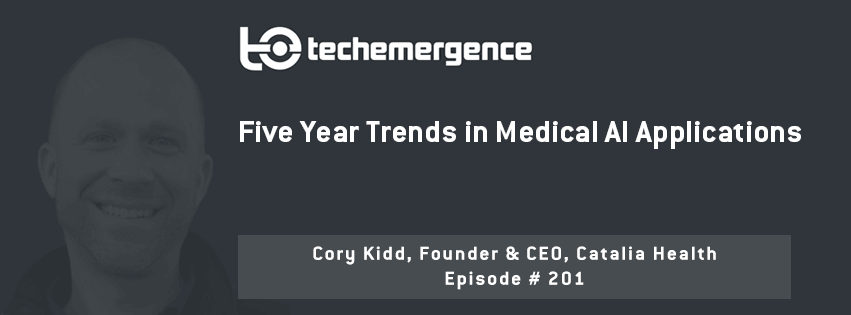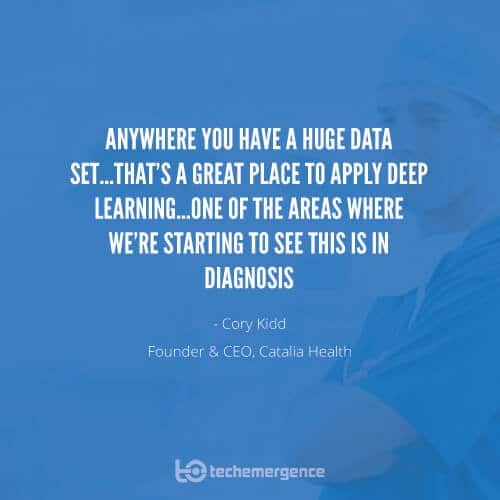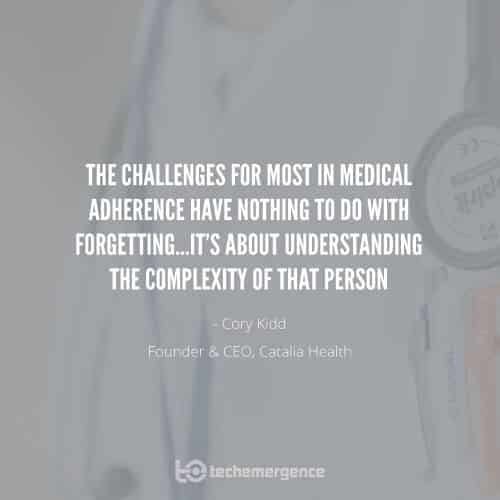
Episode Summary: I remember reading an article in Scientific American years ago about a poster of a person looking in the direction people sitting in a school dining room, and that this poster would make people sitting in the dining room less likely to litter. This seems like an absurd example of holding people accountable for their actions, but as it turns out, there are a lot more serious consequences to ensuring behavior change through observation, and one area where this matters is medicine.
Today, there’s a major issue with people who don’t adhere to their medical regimens, only to relapse or experience more serious symptoms later on. This week’s guest, Cory Kidd, CEO of Catalia Health and known for his work at MIT on human-robotic interaction, is working to help solve this problem by developing a robot that adds some of that physical presence and accountability. This is likely one of many novel medical AI applications that we’re likely to see roll out in healthcare over the next decade.
Expertise: Consumer health applications of emerging technologies
Brief Recognition: Dr. Cory Kidd is the founder and CEO of Catalia Health. Dr. Kidd has been working in healthcare technology for nearly two decades. The focus of his work has been applying innovative technologies towards solving large-scale healthcare challenges. His previous company, Intuitive Automata, created interactive coaches for weight loss. Prior to this, Dr. Kidd received his M.S. and Ph.D. at the MIT Media Lab in human-robot interaction. While there, he conducted studies that showed the psychological and clinical advantages of using a physical robot over screen-based interactions.
Current Affiliations: Founder and CEO of Catalia Health; Director of Business Development for Silicon Valley Robotics; Impact Partner for Fresco Capital; Advisor to Naked Labs, 7 Senses Labs Inc., and 12 Labs; Board Member and Advisor to Weartech Inc.; Mentor for HAX

Interview Highlights:
(2:17) Give us a breakdown of what your company is working on now and why you considered it enough of an AI problem to build a whole company around it.
(4:11) What are some of the other factors in this jungle of incentives and reminders and reasons as to why someone might not take their medication or do as the doctor orders?
(8:23) When this machine can…in terms of interacting, be more personable—we might be coaxing out more of what we have with a kind friend who reminds us to do something – is this on the right track?
(11:30) What are some areas that you think in the coming 5 years might make some traction in medicine?
(18:19) Is licensing of bigger algorithms to individual hospitals likely to be how (diagnostics) gradually rolls out?
Big Ideas:
1 – Changing people’s habits starts with psychology – specifically relationships and behavior change. How do we build relationships over time and how do we choose the right technique for working with a particular individual at a specific point in time? Sitting face to face makes a difference, and that carries over into technology. Catalia Health is trying to build on this concept with a personalized robot (Mabu) who can help trigger these psychological features, by building more intimate relationships with people and helping them better manage their health.
2 – Big data is the place to apply deep learning. Dr. Kidd names three domains where he sees this having a major impact over the next decade:
- Diagnostics – using structured and supervised learning to aid in predicting and identifying diseases
- Insurance and claims – both optimizing healthcare system and identifying early problems with individuals based on historical data
- Behavioral health – optimizing behavior-related treatments, and providing more caregivers where needed












